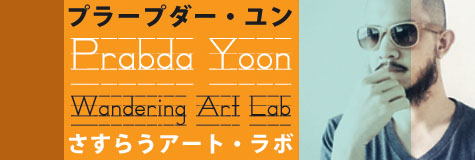
004 本屋中毒者による本の街のポートレート
プラープダー・ユン
小説家・アーティスト
自分以上に激しい本屋中毒者にはいまだに出会ったことがない。信じてほしいのだが、自慢するつもりで言っているわけではない。自分の中毒症状は鬱陶しいものだし、中毒を絶とうとしたことも何度もある。これまでのところ、うまくはいかなかった。
旅をしていないときは、自分の街の本屋に毎日のように通う。もう一度触るという喜びを求めて、同じ本を手に取ることもしばしばだ。 本屋の店員たちと同じくらい、ときには彼ら以上に、本が置かれている場所についても知っている。しかし海外に出かけるときは、この熱狂具合にさらに拍車がかかる。どこかの街に夜明けに到着した直後に、宿にチェックインするかわりに本屋に向かい、開店するのを待つ人間を他に知っているだろうか? 知らないだろう。そういう人物がいるという信頼できる証拠があらわれるまでは、そんなことをしたことのあるのは世界に自分ひとりしかいないと言うつもりだ。
しかしこれは私が素晴らしい読み手であるということを示唆するものではない。実際のところそうではない。私よりも情熱的に読書をしたり、執筆をしたりする人を他にも知っている。私の中毒の対象は、物理的な本がディスプレイされ、売られるスペースなのだ。そしてそれがどういう理由によるものなのかは、自分でもわからない。
私の記憶が確かであれば、この症状はアートについて真剣に関心をいだき始めたのと同じ頃から始まったように思う(読んだり、書いたりすることに対する関心は、これよりずっと前から持っていたが、その関心は本屋とあまり関係がなかった)。授業に退屈し、知る必要のあることを教えられていないという思いを抱いて、学校で過ごすより多くの時間を本屋で過ごしたものだ。1990年代に6年間暮らしたマンハッタンには、遅くまで開いている本屋がいくつかあった。だからそういう店のどこかで、店が閉まるまでを寛いで過ごしたことも頻繁にあった。自分のアパートに住んでいたというより、本屋に住んでいたといっても過言ではなかった。時間を過ごさない自分のアパートのために、毎月家賃を払うかわりに、公園で野営でもして睡眠をとるべきだった。
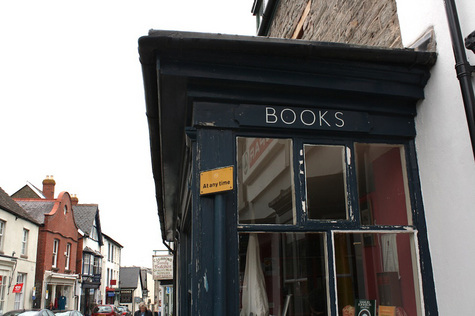
A bookstore in Hay-on Wye
これまでの年月の間に、私の中毒を知っているという共通項だけで団結した人たちが、イギリスのヘイ・オン・ワイという街の話をすることがあった。好きになると思うよ、と言われた。本屋街なんだ、街の大部分が本屋なんだよ、と。奇妙なことに、そのうますぎる情報は、私の頭に印象を残さず、ヘイ・オン・ワイについてそれ以上知ろうと努力することもなかった。だいたい、他人からの勧めを、私の趣味を読み間違えているとか、思い込みだと考えて片付けてしまうことが多かった。なんで彼らは、すべての店が本屋だという街を私が気にいると思うのだろうか?私は奇人だと思われているのだろうか?と考えた。否定するという反応は、つまり中毒者の古典的な病状のあらわれだった。その結果、ヘイ・オン・ワイは私の「行かなければならないところリスト」には入ることはなかったし、もしかしたら、その街の存在すら信じていなかったのかもしれない。その街のことを、ナルニアのようなファンタジーの領域に入るような、架空の街だと考えたかったのだろう。
ふたを開けてみたら「本屋のワンダーランド」は実在していて、何年か前に、自ら体験するチャンスに恵まれた。1970年代に、この小さな田舎町を、自力で世界中に知られる本屋街(「本の街」とも呼ばれる)に変えた「ヘイのキング」閣下であるリカード・ブース氏に拝謁する栄誉にもあずかった。
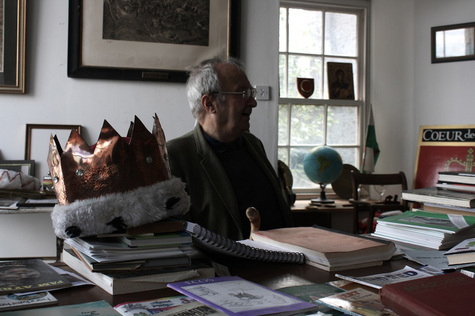
(King) Richard Booth, with his crown, in his office
正確にいうとヘイ・オン・ワイの本屋の大半は古書店なのだが、しかしだからといってその事実が、この街が成し遂げたユニークな偉業と、いくつか例外的にレストランやゲストハウスがある(もちろん中毒者だってときには食べたり寝たりする必要があることは認めざるをえないわけで)ほかは、本の虫たちのために、文字通りすべての商店はほとんど本屋だという、この街の壮観なレイアウトの価値を下げるわけではない。チェーン系の本屋が道を埋めている小さな街を想像してほしい。実のところ、ヘイ・オン・ワイがその手のよくあるタイプの本屋でいっぱいだったとしたら、むしろぞっとする光景かもしれないし、それは十中八九かなり退屈な光景に見えると思う。かわりに、この街はチャーミングで、いくぶんロマンチックな観光名所だった。ヘイ・オン・ワイでは、それぞれの店が違う種類の本を提供していて、だからこそ本屋の街として栄えることに成功していた。詩の本だけを売る店があり、ミステリー・フィクションを専門にした店がいくつかあり、もちろん希少本や収集品、アンティーク本を扱う「高級店」もいくつかあった。リチャード・ブース氏の城(そう、彼は本当に城に暮らし、城で仕事をしている)も巨大な古書店で、多方面のタイトルやジャンルを含んだコレクションは、街で一番整理がついていない印象を受けたが、もっとも折衷主義的なものでもあり、これがなんともブース氏の型破りで遊び心のあるキャラクターにあっていた。リチャード王万歳!
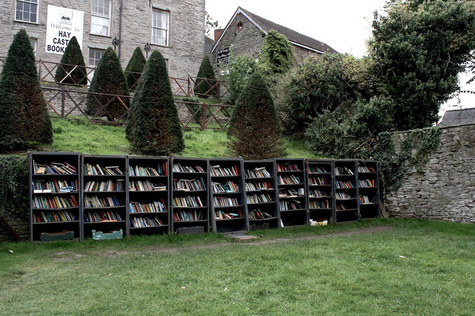
The frontyard of Hay Castle Bookshop, Richard Booth's castle
私が泊まったのは、当たり前のごとく、ひとつひとつの部屋に豊富な蔵書でいっぱいの本棚が備え付けられた小さなゲストハウスだった。多くの評価の高い作家たちが書いた、多くの有名作品に囲まれ、そして現代の本の表紙に比べてきわめて「レトロ」で「古典的」に見える表紙のデザインとともに時間を過ごすチャンスを得て、画像を使った即興アートを作ることにした。本棚からいくつかの本を選び、家のなかのいろんな場所においた。写真の構図によって、たとえ抽象的であってもその本や表紙に物語を加えてくれるような場所に。
私の心のなかでは、この観光写真を撮るのとは一味ちがうアプローチが、ヘイ・オン・ワイに対するオマージュだった。街中の店や路地、そしてイギリスの田舎の心地よい自然を撮ったとしても問題はなかったし、実用的な行為だったかもしれないが、場所というものには、表面的なパターン以上のなにかが存在することが多いのだ。雰囲気、そしてその場所に、その特定の時間に自分がいることの「感情」をなんらかの形でとらえかった。パーソナルなものでありながら、自分自身についてではない何かを。撮った写真は、ヘイ・オン・ワイで出会った本のポートレートだった。

L:Portrait of CHEKHOV, A BIOGRAPHY
R:Portrait of DOSTOYEVSKY'S POOR FOLK & THE GAMBLER
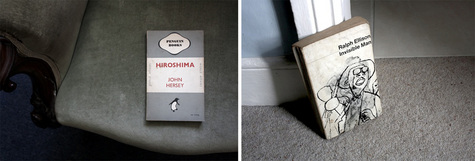
L:Portrait of HIROSHIMA BY JOHN HERSEY
R:Portrait of INVISIBLE MAN BY RALPH ELLISON

L:Portrait of TWO NOVELS BY ROBBE-GRILLET (JEALOUSY) & (IN THE LABYRINTH)
R:Portrait of WAITING FOR GODOT BY SAMUEL BECKETT
本屋中毒にとって、かの有名な「本の街」に滞在することは、無常の至福だったのだろうか? そこで感じたのは恍惚だったのだろうか? ヘイ・オン・ワイで3日間という時間をすごし、その間、毎日同じ本屋を訪ねることに退屈したことはなかった。心地よい時間を過ごしたが、それでも正直なところ、たとえば良質な本屋がいくつかしかないような街で(それがたとえひとつかふたつしかない街だったとしても)、時間を過ごすのと、あまり違う感情は抱かなかった。本を読むという行為と同じように、大切なのは、本自体よりも、そのテキストなのかもしれない。本屋で時間を過ごすことと、本屋でできた街で時間を過ごすことは、まったく違う体験だが、私の中毒は後者に対するものではなかった。潤沢にあるということが核心なのではない。単に所有するということの満足を求めるのだとしたら、所有するということ、そして豊富に所有するということは、同じ結果を導くのだ。
ここまでで推測できたかもしれないが、私自身も多くの本を所有している。特に私の寝室は、引火性の高い空間だ。それでも、たくさん本のある場所を探して家を出る。なぜだろう? 答えを言うのは難しいけれど、きっとそれが私なりのゴドーを待つ(注:サミュエル・ベケットの「ゴドーを待ちながら」から)やり方なのだろうと思う。
004 Judging a Place by Its Cover: a Photographic Portrait of the Town of Books by an Addict
I've not met a bookstore addict more intense than myself. And believe me, I'm not boasting; I find it annoying and I've wanted to kick the habit many times. So far, not so good.
When I'm not traveling, I go to the same bookstores in my city almost daily. I often pick up the same books, simply for the pleasure of touching them again. I know the locations of the books almost as much, and sometimes probably more, as do the staffers. When I go abroad, however, the madness escalates. Have you ever known anyone who, upon arrival in a city at the break of dawn, heads straight to a bookstore and waits around for it to open, instead of checking in at an accommodation first? I didn't think so. Until more reliable evidences surface, I'm going to say that I'm the only person in the world who's done it.
This is not to imply that I'm such a great reader; I am not. I know people who read and write much more passionately. My addiction is about being in the space where physical books are displayed and sold. I'm not really sure why.
If I remember correctly, it started at about the same time I became seriously interested in art. (I was interested in reading and writing well before that, but it didn't have much to do with bookstores.) There were times when, bored of classes and feeling that I was not being taught what I needed to know, I would spend more time in bookstores than in school. In Manhattan, where I lived for 6 years in the nineties, some big bookstores stayed open quite late. So, much too often, I would make myself comfortable in one of those stores until they closed. It wouldn't be an exaggeration to say that I lived in bookstores more than I lived in my apartment. I should've just camped out in the parks for sleep instead of paying the rent every month to not be in my apartment.
Over the years, several people, united only, perhaps, by the knowledge of my addiction, had mentioned the English town Hay-on-Wye to me. You'd love this place, they said; it's a bookstore town, almost every store in the place is a bookstore! Strangely, that too-good-too-be-true information never really registered with me and I made no effort to find out more about Hay-on-Wye. I generally dismissed the recommendation as a possible miscalculation, or a weak presumption, of my taste. Why would they think that I'd appreciate a town in which every store was a bookstore? Do they see me as some kind of freak? Denial: a classic symptom of an addict. As a result, Hay-on-Wye was never put on my Must Visit list, and I probably never even believed its existence in the first place, preferring to regard it as some made up, fantasy realm, like Narnia.
Well, it turned out Bookstore Wonderland was real and I eventually had the chance to experience it firsthand a few years ago. I even had the privilege of having an audience with His Majesty "King of Hay," Richard Booth, who singlehandedly turned the small rural town into a world-renowned bookstore town (or "Town of Books") in the seventies.
To be accurate, most of the bookstores in Hay-on-Wye are secondhand books bookstores, but that doesn't undermine its unique accomplishment and, for book lovers, spectacular town layout, where, with few exceptions of restaurants and guesthouses (because, admittedly, even addicts have to eat and sleep sometimes), literally every store is indeed a bookstore. In fact, if Hay-on-Wye were filled with only the usual bookstores--imagine a small town where all the chain bookstores line the streets--it might be a rather horrendous sight, and most likely quite boring, instead of this charming, somewhat romantic, tourist attraction. Hay-on-Wye manages to thrive as a bookstore town precisely because every one of its store has different kinds of books to offer. There is a store that sells only poetry books, a couple of joints specialize in mystery fiction, and of course there are several "upscale" establishments dealing in rare editions, collectables and antique books. Richard Booth's own castle (yes, he really does lives and works in a castle) is itself a huge secondhand bookstore, containing perhaps the most eclectic collection of titles and genres, though it seemed to me to be also the most disorganized, which somewhat fits Booth's unconventional, playful character. The madness of King Richard!
I stayed at a small guesthouse that was, unsurprisingly, furnished with many well-stocked bookshelves, in every room. I used the opportunity of being surrounded by so many famous titles by so many "acclaimed" authors, and with cover designs that looked very "retro" and "classic" in comparison to contemporary book cover designs, to make some improvisational photographic art. I selected some titles from the shelves and placed them in various spots of the house, where I felt the compositions added some sort of narrative, however abstract, to the books and their covers.
In my mind, this was an homage to Hay-on-Wye itself, a different kind of approach to touristic photography. It would have been fine and practical to take photographs of the stores and the streets and the pleasant nature of an English countryside, but often there's something more to a place than the patterns on its skin. I wanted to somehow capture the atmosphere, the "feeling," of being in that particular place at that particular time; something personal yet not of or about myself. The photographs are portraits of some of the books I met in Hay-on-Wye.
For a bookstore addict, was being in the renowned "Town of Books" a blissful experience? Was it ecstasy? I spent about 3 days in Hay-on-Wye, and true, I was never bored of going into the same stores everyday. I had a pleasant time, yet, to be honest, it didn't feel much different from being in a place with only a few, even just one or two, good bookstores. Perhaps like reading a book, what really matters is the text, not the book itself. Being in bookstores and being in a town made up of bookstores are quite different things, and my addiction is not in the latter. Abundance is not really the point; having and having a lot amount to the same result, if what one seeks is simply the satisfaction of having.
As you might be able to guess by now, I possess a lot of books myself. My bedroom, especially, is highly flammable. Still, I go out of my house to look for more places with a lot of books. Why? It's hard to say, but I guess it's my way of waiting for Godot.
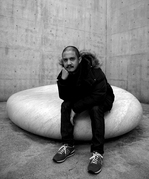 プラープダー・ユン
プラープダー・ユン
1973年生まれ、バンコクに拠点を置くタイの小説家・アーティスト。
多数の小説、短編小説やエッセイのコレクションを出版し、「ライ麦畑でつかまえて」「時計じかけのオレンジ」のような現代英語の古典文学もタイ語に翻訳。2002年に、彼の短編小説のコレクション「存在のあり得た可能性(英題:Probability)」で、タイで最も権威ある東南アジア文学賞を受賞。 他、プラープダーは定期的に日本で雑誌に執筆したり、アートのエキシビションを開催。また、映画「地球で最後のふたり」「インビジブル・ウェーブ」(主演:浅野忠信)の脚本や、現代アーティスト名和晃平の様々なアートプロジェクトにも協力。最新の小説は「パンダ」
Prabda Yoon
Born in 1973, a Thai writer and publisher based in Bangkok. He has published numerous novels, short story collections, and essay collections. In addition, he has also translated modern English-language classic literature such as The Catcher in the Rye and A Clockwork Orange into Thai. In 2002, his short story collection, Kwam Na Ja Pen (English: Probability), won the SEA Write Award.
Apart from working in Thailand, Prabda has regularly written for Japanese magazines and exhibited artworks in Japan. He has written 2 screenplays for films starring Tadanobu Asano and he is presently collaborating on various art projects with Japanese contemporary artist Kohei Nawa. His literary works have been translated into Japanese, of which the most recent is the novel Panda.

